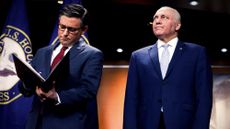John Oliver shoots down 'Stand Your Ground' laws, America's 'Rosetta Stone for Justified Homicides'

Guns are everywhere in America, "but this story isn't so much about guns themselves as it is about one particular law that significantly expanded how they're used," John Oliver said on Sunday's Last Week Tonight. "Stand Your Ground" laws, on the books in 30 states, "were originally pitched as a law-and-order measure to protect people forced to make difficult decision in impossible life-or-death situations," but "in practice, they can be invoked in incidents that really seem like they didn't need to turn deadly."
"Don't worry, we're not going to show you the far-too-plentiful footage of people getting shot in public places tonight — frankly, we're just one senseless murder away from HBO Max putting this show in the 'Endless Parade of Human Misery' category, alongside Chernobyl and Entourage," Oliver joked darky. "But given the prevalence of Stand Your Ground laws and the racial disparities in who they do and, crucially, don't protect, we thought tonight it would be worth taking a look at them."
Stand Your Ground laws are "redundant solutions to a made-up problem and they are actively doing harm," Oliver said. Basically, "if you have a reasonable fear someone might hurt you, you have just as much right to shoot them in the street as you would if they were coming though the window of your house." One woman, gun lobbyist Marion Hammer, has done more than anyone to push through these laws, he explained, running through her story.
Subscribe to The Week
Escape your echo chamber. Get the facts behind the news, plus analysis from multiple perspectives.

Sign up for The Week's Free Newsletters
From our morning news briefing to a weekly Good News Newsletter, get the best of The Week delivered directly to your inbox.
From our morning news briefing to a weekly Good News Newsletter, get the best of The Week delivered directly to your inbox.
A big problem with the laws is "it all comes down to perceived fear, whether you legitimately saw someone as a threat, and that is definitionally subjective," Oliver said. "And it's made even harder by the fact that often the only other person who knows what happened in the incident is now dead." There are literal scripts for how to describe fatal shootings to avoid jail, he added. "It seems all you have to do is memorize a few key phrases, and you too could be free to shoot with impunity. It's basically Rosetta Stone for Justified Homicides."
"Stand Your Ground laws have contributed to a society where vigilantes with guns feel they have the right to decide what is safety, who is a threat, and what the punishment should be," Oliver said. "They have turbo-charged everything from road rage incidents to pointless disputes over dog weights." And yes, that last dispute is real. Watch below.
Create an account with the same email registered to your subscription to unlock access.
Sign up for Today's Best Articles in your inbox
A free daily email with the biggest news stories of the day – and the best features from TheWeek.com
Peter has worked as a news and culture writer and editor at The Week since the site's launch in 2008. He covers politics, world affairs, religion and cultural currents. His journalism career began as a copy editor at a financial newswire and has included editorial positions at The New York Times Magazine, Facts on File, and Oregon State University.
-
 Nigeria's worsening rate of maternal mortality
Nigeria's worsening rate of maternal mortalityUnder the radar Economic crisis is making hospitals unaffordable, with women increasingly not receiving the care they need
By Harriet Marsden, The Week UK Published
-
 'Elevating Earth Day into a national holiday is not radical — it's practical'
'Elevating Earth Day into a national holiday is not radical — it's practical'Instant Opinion Opinion, comment and editorials of the day
By Harold Maass, The Week US Published
-
 UAW scores historic win in South at VW plant
UAW scores historic win in South at VW plantSpeed Read Volkswagen workers in Tennessee have voted to join the United Auto Workers union
By Peter Weber, The Week US Published
-
 Ukraine cheers House approval of military aid
Ukraine cheers House approval of military aidSpeed Read Following a lengthy struggle, the House has approved $95 billion in aid for Ukraine and Israel
By Peter Weber, The Week US Published
-
 Myanmar: the Spring Revolution and the downfall of the generals
Myanmar: the Spring Revolution and the downfall of the generalsTalking Point An armed protest movement has swept across the country since the elected government of Aung San Suu Kyi was overthrown in 2021
By The Week Staff Published
-
 Poland, Germany nab alleged anti-Ukraine spies
Poland, Germany nab alleged anti-Ukraine spiesSpeed Read A man was arrested over a supposed Russian plot to kill Ukrainian President Zelenskyy
By Peter Weber, The Week US Published
-
 Israel hits Iran with retaliatory airstrike
Israel hits Iran with retaliatory airstrikeSpeed Read The attack comes after Iran's drone and missile barrage last weekend
By Peter Weber, The Week US Published
-
 Is there a peaceful way forward for Israel and Iran?
Is there a peaceful way forward for Israel and Iran?Today's Big Question Tehran has initially sought to downplay the latest Israeli missile strike on its territory
By Sorcha Bradley, The Week UK Published
-
 Peter Murrell: Sturgeon's husband charged over SNP 'embezzlement' claims
Peter Murrell: Sturgeon's husband charged over SNP 'embezzlement' claimsSpeed Read SNP expresses 'shock' as former chief executive rearrested in long-running investigation into claims of mishandled campaign funds
By Arion McNicoll, The Week UK Published
-
 Mark Menzies: Tories investigate MP after 'bad people' cash claims
Mark Menzies: Tories investigate MP after 'bad people' cash claimsSpeed Read Fylde MP will sit as an independent while party looks into allegations he misused campaign funds on medical expenses and blackmail pay-out
By Arion McNicoll, The Week UK Published
-
 Why Johnson won't just pass Ukraine aid
Why Johnson won't just pass Ukraine aidSpeed Read The House Speaker could have sent $60 billion in military aid to Ukraine — but it would have split his caucus
By Peter Weber, The Week US Published